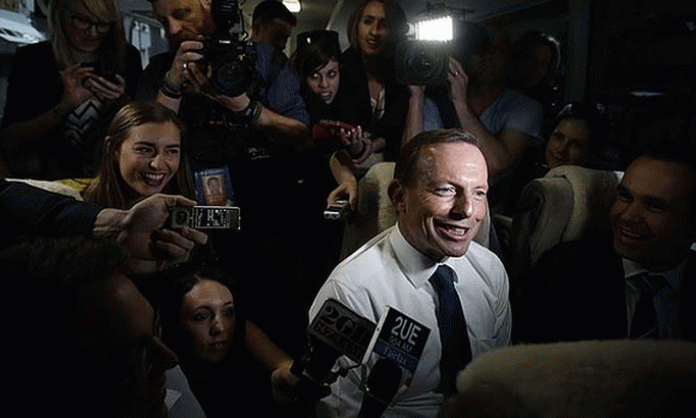Is the US Daily Show’s comedy coverage of the Australian election – which focussed on an idiot candidate who couldn’t remember his own party’s policies, a sexting scandal involving red wine and a racist who thought Islam was a country – really that different from that of the serious Australian media (or the Australian)?
When it’s not pratfalls and gaffes, we are served a diet of opinion polls that tell us whether more of us rate Rudd or Abbott as trustworthy. Article after article questions politicians’ style and performance.
The “quality” press, such as the Sydney Morning Herald or the Age, are just as much content-free zones as the Murdoch papers.
For example, the Sydney Morning Herald’s 24 August editorial began like this: “With two weeks left, we know that trust will determine who prevails on election day.”
It concluded with that other important policy, “stability”, and who was more likely to deliver it, and a final sentence as anodyne as the beginning: “Abbott must prove that he deserves to be trusted enough to become prime minister.”
Nothing about the fact that the only thing we can trust in is that, whoever wins, their policies will be right wing, anti-working class and racist.
A cursory glance at any news website will yield a tonne of this dross: “Australia is getting used to the idea of Tony Abbott, prime minister”, apparently because of his “deliberate effort to throw the switch from negative to positive, from angry opposition leader to measured potential prime minister”.
Over and over there’s the same crap about confidence and other intangibles. While we are told Abbott has “polished and direct delivery and … facility for distilling messages into digestible ‘grabs’”, Rudd’s problem appears to be that he’s “often verbose”. Why don’t we just read the entrails of some dead animal and be done with it?
Labor’s contempt for its supporters doesn’t figure much in explaining why it looks like losing the election. Cutting welfare benefits for single mothers and refusing to increase the poverty-level dole, while raising almost nothing from the mining tax on the super-rich doesn’t help its cause.
Yet none of this finds anywhere near the analysis of “commonsense reasonableness”, “extraordinary stamina and growing confidence” and similar tripe.
The media virtually never call the parties to account over real issues. The question is only whether or not the latest development is a good move in terms of wedging the opponent, rather than whether it will be good for workers and the poor. If you want to find sharp questioning that attempts to hold a politician to account, you need to lower yourself to the depths of watching billionaire buffoon Clive Palmer being grilled by Lateline’s Emma Albarici.
And then the calling to account is really just a calling back to planet Earth: is the Palmer United Party really going to win 15 seats? Is your policy what’s on your website or what pops into your head during this interview? And so on.
There is one place where the real issues of which class benefits and which class is being screwed gets some airing (apart from the pages of Red Flag, of course).
The business pages and the more in-house journals of the capitalist class like the Australian Financial Review are more revealing.
The Sydney Morning Herald economics editor, Ross Gittins, did write an article titled “Rich win big with class warfare in session”, which correctly identifies the class war being waged by the rich with the help of the major parties:
“If you think the class war is over, you’re not paying enough attention. The reason the well-off come down so hard on those who use class rhetoric is that they don’t want anyone drawing attention to how the war’s going. All of them except Warren Buffett, the mega-rich American investor. ‘There’s class warfare, all right,’ he once said, ‘but it’s my class, the rich class, that’s making war, and we’re winning.’”
But he then went on to blame it on us: “The workers are too busy watching telly to notice the ways they’re being got at. It requires attention to boring things like superannuation when you could be up the club playing the pokies.”
There’s a much better explanation of why, for example, a quarter of voters under 25 have failed to enrol. An Australia Institute survey of under-25s indicated that 40 percent felt that none of the political parties represented the interests of young people.
Professor Ian McAllister of the Australian National University says of his election surveys, “Young people are not any less interested in politics. They are just not interested in what is being offered.” And so say all of us.









